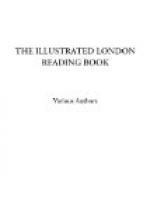Were the sun, which enlightens this part of the creation, with all the host of planetary worlds that move about him, utterly extinguished and annihilated, they would not be missed more than a grain of sand upon the sea-shore. The space they possess is so exceedingly little in comparison of the whole, it would scarce make a blank in creation. The chasm would be imperceptible to an eye that could take in the whole compass of nature, and pass from one end of creation to the other; as it is possible there may be such a sense in ourselves hereafter, or in creatures which are at present more exalted than ourselves. We see many stars by the help of glasses, which we do not discover with our naked eyes; and the finer our telescopes are, the more still are our discoveries. Huygenius carries this thought so far, that he does not think it impossible there may be stars whose light is not yet travelled down to us since their first creation. There is no question but the universe has certain bounds set to it; but when we consider that it is the work of infinite power, prompted by infinite goodness, with an infinite space to exert itself in, how can our imagination set any bounds to it?
To return, therefore, to my first thought, I could not but look upon myself with secret horror, as a being that was not worth the smallest regard of one who had so great a work under his care and superintendency. I was afraid of being overlooked amidst the immensity of nature, and lost among that infinite variety of creatures, which in all probability swarm through all these immeasurable regions of matter.
In order to recover myself from this mortifying thought, I considered that it took its rise from those narrow conceptions which we are apt to entertain of the Divine nature. We ourselves cannot attend to many different objects at the same time. If we are careful to inspect some things, we must of course neglect others. This imperfection which we observe in ourselves is an imperfection that cleaves in some degree to creatures of the highest capacities, as they are creatures, that is, beings of finite and limited natures. The presence of every created being is confined to a certain measure of space, and consequently his observation is stinted to a certain number of objects. The sphere in which we move, and act, and understand, is of a wider circumference to one creature than another, according as we rise one above another in the scale of existence. But the widest of these our spheres has its circumference. When therefore we reflect on the Divine nature, we are so used and accustomed to this imperfection in ourselves, that we cannot forbear in some measure ascribing it to Him in whom there is no shadow of imperfection. Our reason indeed assures us that his attributes are infinite; but the poorness of our conceptions is such, that it cannot forbear setting bounds to every thing it contemplates, till our reason comes again to our succour and throws down all those little prejudices which rise in us unawares, and are natural to the mind of man.




